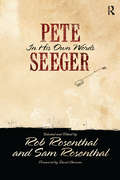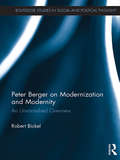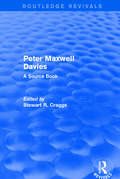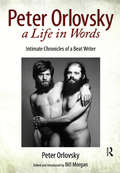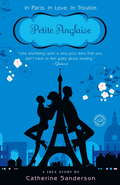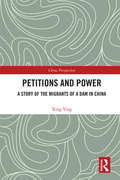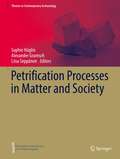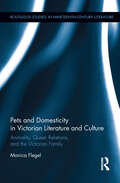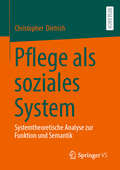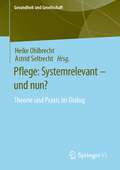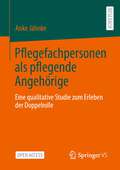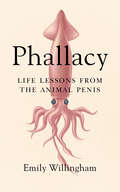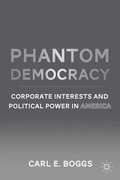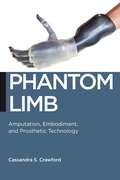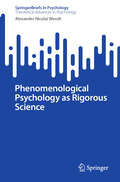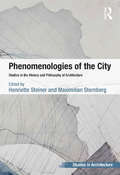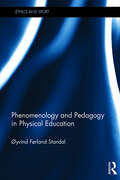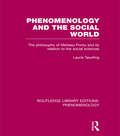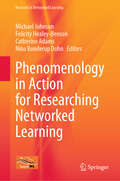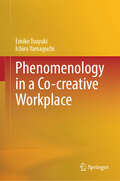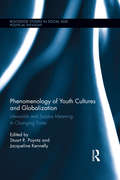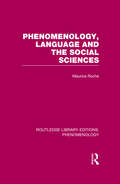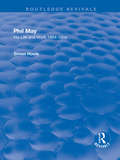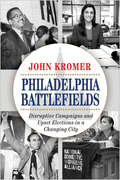- Table View
- List View
Pete Seeger in His Own Words: His Life In His Own Words
by Pete Seeger Rob Rosenthal Sam RosenthalLong an icon of American musical and political life, Pete Seeger has written eloquently in a diverse array of publications but nowhere is his life story more personally chronicled than in these, his private writings, documents and letters stored for decades in his family barn. Pete Seeger: His Life in His Own Words, collects Seeger's letters, notes, published articles, rough drafts, stories and poetry - creating the most intimate picture yet available of Seeger as a musician, an activist and a family man. The book covers the passions, personalities and experiences of a lifetime of struggle - from the pre-WWII labour movement and the Communist Party, to Woody Guthrie, the Civil Rights movement and the struggle against the war in Vietnam. The portrait that emerges is not of a saint, but a flesh-and-blood man, struggling to understand his time and his place.
Peter Berger on Modernization and Modernity: An Unvarnished Overview (Routledge Studies in Social and Political Thought)
by Robert BickelWith particular attention to his work on modernization and modernity as construed by a sociologist of knowledge, this book offers a sympathetic exposition and evaluation of Peter Berger’s work as one of the world’s most accomplished and influential sociologists. In the context of an examination of Berger’s ongoing work on the social construction of reality, styles of consciousness, the role of science-based technology, pluralism, and other pertinent topics, the author also considers Berger’s unique and thoughtful approach to research and theorizing. Berger’s method of ‘sociological tourism’, which departs sharply from the current emphasis in the social sciences on ever more complex and ostensibly rigorous statistical procedures, provides a refreshing move away from the increasingly esoteric and sometimes alienating methodological self-consciousness that characterizes contemporary sociology. With this distinctive approach, this book will appeal to scholars and students of sociology who share Berger’s interest. The importance of modernization and modernity on a world scale is undeniable, and a deeper understanding of their nature and consequences, will also benefit members of the intelligent laity who are not sociological specialists but are open to new ideas that are clearly explained.
Peter Maxwell Davies: A Source Book
by Stewart R. CraggsThis title was first published in 2002. Sir Peter Maxwell Davies is one of Britain's most distinguished composers. This source book documents as much of the material on his music as is available to 2001. As Richard McGregor points out in his foreword to the volume, Stewart Craggs has made valuable advances in sorting out the origins of many unknown works and gleaning details of many private compositions. The book also supplies details of those unknown works which haven't appeared in any previous catalogues, including broadcasts of early works from the BBC Archives. With information given on first performances, manuscript locations and recordings, in addition to details of composition dates, authors/librettists, durations, commissions and dedications amongst much else, this book is a key reference source for all those interested in Peter Maxwell Davies and his music.
Peter Orlovsky, a Life in Words: Intimate Chronicles of a Beat Writer
by Bill Morgan Peter OrlovskyUntil now, the poet Peter Orlovsky, who was Allen Ginsberg's lover for more than forty years, has been the neglected member of the Beat Generation. Because he lived in Ginsberg's shadow, his achievements were seldom noted and his contributions to literature have not been fully recognised. Now, this first collection of Orlovsky's writings traces his fascinating life in his own words. It also tells, for the first time, the intimate story of his relationship with Ginsberg. Drawn from previously unpublished journals, correspondence, photographs and poems, Peter Orlovsky, a Life in Words, begins as Orlovsky is discharged from the Army; follows the young man through years of self-doubt and details his first meeting with Ginsberg in San Francisco from his own perspective. In never-before-heard detail, Orlovsky describes his travels around the world with Ginsberg, Kerouac, Burroughs and Corso. The book also delves into the contradictions that ultimately defined him: best known as Ginsberg's lover, Orlovsky was heterosexual and always longed to be with women; his spirit was prescient of the flower children of the sixties - especially his inclinations toward devotion and love - but in the end his use of drugs took its toll on his body and mind, silencing one of the most original and inspiring voices of his generation.
Petite Anglaise: In Paris. In Love. In Trouble.
by Catherine Sanderson"When Tadpole was born, I spent a sleepless night on the maternity ward gazing intently into her inky, newborn eyes, grappling to come to terms with the indisputable fact that this was an actual person looking back at me, not just a version of Mr. Frog, or me, or both, in miniature. From the outset she seemed to know what she wanted, and I realized I could have no inkling of the paths she would choose to follow. But if I watch her life unfold carefully enough, perhaps I will see clear signposts pointing to who or what she will become. Because when I look backward, ransacking my own past for clues with the clarity that only hindsight can bring, a series of defining moments do stand out. Moments charged with significance; snapshots of myself which, if I join the dots together, lead me unswervingly to where I stand today: from French, to France, to Paris, and to Petite Anglaise." [ed. note - excerpted from Petite Anglaise, p.4]Catherine Sanderson has a beautiful bilingual daughter, an authentic French boyfriend, and a Paris apartment with bohemian charm. She has what she has always wanted -- a life in France.Growing up in Yorkshire amidst a traditional family, Catherine had set her sights on a different life -- a life that would immerse her in an exotic language and culture. From grammar school French lessons to teaching English in Normandy and finally to a permanent job in Paris, she was determined that France would be the place she would call home.But now that she does, things are not so idyllic. Catherine wonders just when her life in Paris turned from wine to vinegar: She's stuck in a dead-end administrative job, her relationship with her boyfriend has settled into a dreary routine, and the birth of their daughter has not helped to reignite the dying fire of her relationship.The remedy to her dissatisfaction arrives in the morning headlines. While scanning the news of the day, Catherine becomes intrigued by a story profiling an internet diarist. After exploring one blog after another, and in one exhilarating moment, Catherine decides to create her own online persona, her jardin secret. At that moment, she is transformed from Catherine to Petite Anglaise, her boyfriend to Mr. Frog, her daughter to Tadpole, and her life to something she could never have predicted.What begins as a lighthearted diversion, a place to discuss the fish-out-of water challenges of ex-pat life in Paris, soon gives way to a raw forum for her to bare her most intimate secrets and impulsive desires. Thousands of readers log-on to the blog and are witness to the ever-widening gulf between Petite Anglaise and Mr. Frog. Those public revelations of her growing frustrations, which play out in each successive post, begin to surreptitiously yet irrevocably erode their relationship.From the Hardcover edition.
Petitions and Power: A Story of the Migrants of a Dam in China (China Perspectives)
by Xing YingUsing the way of storytelling, this book examines the petitions of the migrants of a dam in China. With the intensive and thorough analysis of the unique logic behind the petitions, it explores the complex relationship between Chinese peasants and governments, where people may find the key to the mysteries of Chinese society. As the first academic monograph which systematically studies petition, the peculiar Chinese social phenomenon, this book describes the collective action of the rural migrants who had fallen into poverty due to the construction of a dam in China’s Three Gorges area. By investigating the ups and downs of the petitions, it reveals the operating mechanism of Chinese counties, the conflicts between the officials and the masses, as well as Chinese political culture, especially the subtle process of the contest of powers. It observes that the peasants’ pursuit of justice not only temporarily maintains the balance of interests, but also makes the legitimacy of the party-state been reproduced. With substantial first-hand materials and empirical analyses, this book will be a valuable reference for scholars and students to study Chinese politics and society.
Petrification Processes in Matter and Society (Themes in Contemporary Archaeology)
by Sophie Hüglin Alexander Gramsch Liisa SeppänenPetrification is a process, but it also can be understood as a concept. This volume takes the first steps to manifest, materialize or “petrify” the concept of “petrification” and turn it into a tool for analyzing material and social processes. The wide array of approaches to petrification as a process assembled here is more of a collection of possibilities than an attempt to establish a firm, law-generating theory. Divided into three parts, this volume’s twenty-plus authors explore petrification both as a theoretical concept and as a contextualized material and social process across geological, prehistoric and historic periods. Topics connecting the various papers are properties of materials, preferences and choices of actors, the temporality of matter, being and becoming, the relationality between actors, matter, things and space (landscape, urban space, built space), and perceptions of the following generations dealing with the petrified matter, practices, and social relations. Contributors to this volume study specifically whether particular processes of petrification are confined to the material world or can be seen as mirroring, following, triggering, or contradicting changes in social life and general world views. Each of the authors explores – for a period or a specific feature – practices and changes that led to increased conformity and regularity. Some authors additionally focus on the methods and scrutinize them and their applications for their potential to create objects of investigation: things, people, periods, in order to raise awareness for these or to shape or “invent” categories. This volume is of interest to archaeologists, geologists, architectural historians, conservationists, and historians.
Pets and Domesticity in Victorian Literature and Culture: Animality, Queer Relations, and the Victorian Family (Routledge Studies in Nineteenth Century Literature)
by Monica FlegelAddressing the significance of the pet in the Victorian period, this book examines the role played by the domestic pet in delineating relations for each member of the "natural" family home. Flegel explores the pet in relation to the couple at the head of the house, to the children who make up the family’s dependents, and to the common familial "outcasts" who populate Victorian literature and culture: the orphan, the spinster, the bachelor, and the same-sex couple. Drawing upon both animal studies and queer theory, this study stresses the importance of the domestic pet in elucidating normative sexuality and (re)productivity within the familial home, and reveals how the family pet operates as a means of identifying aberrant, failed, or perverse familial and gender performances. The family pet, that is, was an important signifier in Victorian familial ideology of the individual family unit’s ability to support or threaten the health and morality of the nation in the Victorian period. Texts by authors such as Clara Balfour, Juliana Horatia Ewing, E. Burrows, Bessie Rayner Parkes, Anne Brontë, George Eliot, Frederick Marryat, and Charles Dickens speak to the centrality of the domestic pet to negotiations of gender, power, and sexuality within the home that both reify and challenge the imaginary structure known as the natural family in the Victorian period. This book highlights the possibilities for a familial elsewhere outside of normative and restrictive models of heterosexuality, reproduction, and the natural family, and will be of interest to those studying Victorian literature and culture, animal studies, queer studies, and beyond.
Pfade und Berge: Entwurf einer allgemeinen Theorie transformatorischer Bildungsprozesse am Beispiel des japanischen Kyōgen (Kindheit – Bildung – Erziehung. Philosophische Perspektiven)
by Klaus-Christian ZehbeTransformatorische Bildungstheorien beschreiben ›Bildung‹ zumeist als Wandlung von Selbst-, Welt- und Fremdverhältnissen. Empirisch werden solche Wandlungsprozesse häufig rückblickend über einschneidende biographische Ereignisse rekonstruiert. Doch wie kann man alltägliche Wandlungen und Prozesse des ›sich bildens‹ in ihren Entstehungskontexten beschreiben? Die stark kodifizierte, japanische Theaterform des Kyōgen bietet einen lebensweltlichen Rahmen, in dem alltägliche Prozesse des ›sich bildens‹ beobachtbar werden. Auf der Grundlage von bildungstheoretischen Überlegungen und ethnographisch teilnehmender Beobachtung wird mittels der Q-Methodology ein eigenständiger, theoretischer und methodischer Ansatz entwickelt, der erlaubt, alltägliche Bildungsprozesse in einem gegebenen Feld ›vorausblickend‹ zu rekonstruieren. Die Studie eröffnet damit einen neuen Zugang sowie ein neues Forschungsfeld für die qualitative empirische Bildungsforschung.
Pflege als soziales System: Systemtheoretische Analyse zur Funktion und Semantik
by Christopher DietrichDie durch den Altersstrukturwandel ausgelöste Transformation in eine ältere und zunehmend pflegebedürftige Gesellschaft lässt den Bedarf an pflegerischer Versorgung in den wohlhabenderen Regionen der Erde ansteigen. Diese erzwingt absehbar gesellschaftliche Entscheidungen, welche den Umgang mit Pflegebedürftigkeit langfristig bestimmen werden. Die vorliegende Studie eröffnet eine soziologische Perspektive auf die Pflege unter Anwendung von Luhmanns Systemtheorie. Die Kategorisierung der Pflege als ein soziales Funktionssystem begründet sich zunächst über die Aufdeckung ihrer spezifizierten Unterscheidung (Codierung), die aus historischen Entwicklungen, Semantiken und weiteren sozialen Strukturen hervorgeht. Zudem wird die Annahme eines ausdifferenzierten Systems durch eine Abgrenzung zu den Systemen Religion, Krankenbehandlung, Gesundheit und Familie fundiert. Diese Aspekte münden in eine Funktionsbestimmung des Pflegesystems, welche der Klärung zentraler Fragen der Pflegewissenschaft dient: ‚Was ist Pflege‘ und ‚Was steckt dahinter‘? Die durch Abstraktion gewonnene vereinigende Darstellung der beobachteten Phänomene pflegerischer Kommunikation soll dazu beitragen, den Forschungsgegenstand der Pflegewissenschaft zu bestimmen. Erst dann kann die Pflegewissenschaft erwarten, dass ihre Beiträge über den Umgang mit Pflegebedürftigkeit Anschlussfähigkeit herstellen und an der gesellschaftliche Entscheidungsbildung mitwirken.
Pflege: Theorie und Praxis im Dialog (Gesundheit und Gesellschaft)
by Heike Ohlbrecht Astrid SeltrechtSeit der COVID19-Pandemie werden die Pflegeberufe in der öffentlichen Wahrnehmung in neuer Form wertgeschätzt und als systemrelevant diskutiert. Der Pflegealltag hat sich seit der Corona-Pandemie durch kurzfristiges Krisenmanagement und langfristiger Ungewissheit der weiteren Entwicklung verändert. Diesen Spannungsbogen nimmt das Buch in den Blick und geht hierbei folgenden Fragen nach:Deckt sich die kollektive Aufwertung, die Pflege sei systemrelevant, mit der subjektiven Einschätzung der einzelnen Pflegefachkraft? Welche neuen Herausforderungen begegnen den Pflegefachkräften? Wie erleben sie ihren veränderten Berufsalltag? Wie gehen sie mit der permanenten Bedrohung durch Ansteckung bis hin zu einem erneuten Lockdown um? Darüber hinaus ist bislang unklar, inwieweit die COVID19-Pandemie Auswirkungen auf die Berufswahlentscheidung und -motivation nimmt.
Pflegefachpersonen als pflegende Angehörige: Eine qualitative Studie zum Erleben der Doppelrolle
by Anke JähnkeIn diesem Open-Access-Buch stehen Pflegefachpersonen im Zentrum, die zugleich pflegende Angehörige sind. Als professionell Pflegende verfügen sie über Fachwissen, pflegefachliche Kompetenzen und Kenntnisse zum Versorgungssystem. Als pflegende Angehörige sind sie persönlich betroffen. Die qualitative Studie fokussiert auf das Erleben der Doppelrolle als beruflich Pflegende und zugleich pflegende Angehörige. Sind dies ‚zwei Paar Schuhe‘? Ausgehend von einer Literaturrecherche und der Sekundäranalyse von Interviewdaten wurden episodische Interviews mit 15 Interviewpartner*innen geführt. Die Datenanalyse verdeutlicht ihre Aufgaben im Krankheitsverlauf, welche Entwicklungen sie durchlaufen und ihre Erfahrungen in der Doppelrolle. Die Studie zeigt, dass die Befragten über ein Repertoire von Handlungsoptionen verfügen, die sie im Umgang mit Fachpersonen der Gesundheitsversorgung nutzen. Die gewonnenen Erkenntnisse werden in einem Modell gebündelt, das ihre Positionierung als pflegende Angehörige und zugleich Pflegefachperson im Versorgungskontext veranschaulicht.
Phallacy: Life Lessons from the Animal Penis
by Emily WillinghamA wry look at what the astonishing world of animal penises can tell us about how we use our own.The fallacy sold to many of us is that the penis signals dominance and power. But this wry and penetrating book reveals that in fact nature did not shape the penis--or the human attached to it--to have the upper...hand. Phallacy looks closely at some of nature's more remarkable examples of penises and the many lessons to learn from them. In tracing how we ended up positioning our nondescript penis as a pulsing, awe-inspiring shaft of all masculinity and human dominance, Phallacy also shows what can we do to put that penis back where it belongs. Emphasizing our human capacities for impulse control, Phallacy ultimately challenges the toxic message that the penis makes the man and the man can't control himself. With instructive illustrations of unusual genitalia and tales of animal mating rituals that will make you particularly happy you are not a bedbug, Phallacy shows where humans fit on the continuum from fun to fatal phalli and why the human penis is an implement for intimacy, not intimidation.
Phantom Democracy
by Carl BoggsBoggs explores the evolution of concentrated corporate and military power through American history andits impact on our democracy. The events of 9/11 and their aftermath have only deepened the trend toward ever-more concentrated forms of power in a society that ostensibly embraces democratic values. Such developments, Boggs argues, have deep origins in American history going back to the founding documents, ideological precepts of the Constitution, early oligarchic rule, slavery, the Indian wars, and westward colonial expansion. "
Phantom Limb: Amputation, Embodiment, and Prosthetic Technology (Biopolitics #16)
by Cassandra S. CrawfordPhantom limb pain is one of the most intractable and merciless pains ever known—a pain that haunts appendages that do not physically exist, often persisting with uncanny realness long after fleshy limbs have been traumatically, surgically, or congenitally lost. The very existence and “naturalness” of this pain has been instrumental in modern science’s ability to create prosthetic technologies that many feel have transformative, self-actualizing, and even transcendent power. In Phantom Limb, Cassandra S. Crawford critically examines phantom limb pain and its relationship to prosthetic innovation, tracing the major shifts in knowledge of the causes and characteristics of the phenomenon. Crawford exposes how the meanings of phantom limb pain have been influenced by developments in prosthetic science and ideas about the extraordinary power of these technologies to liberate and fundamentally alter the human body, mind, and spirit. Through intensive observation at a prosthetic clinic, interviews with key researchers and clinicians, and an analysis of historical and contemporary psychological and medical literature, she examines the modernization of amputation and exposes how medical understanding about phantom limbs has changed from the late-19th to the early-21st century. Crawford interrogates the impact of advances in technology, medicine, psychology and neuroscience, as well as changes in the meaning of limb loss, popular representations of amputees, and corporeal ideology. Phantom Limb questions our most deeply held ideas of what is normal, natural, and even moral about the physical human body.
Phenomenological Psychology as Rigorous Science (SpringerBriefs in Psychology)
by Alexander Nicolai WendtExperimental psychology depends on theoretical and methodological foundations. Addressing these foundations is not always trivial and requires a shift in epistemological perspective. Phenomenology can provide a framework that helps to discuss the possibilities and challenges of the discipline. This book provides a historical overview of the phenomenological movement as well as a systematic introduction to the research approaches that are known as ‘phenomenological psychology’. The central claim is that the phenomenological discourse can increase the conceptual, descriptive, and methodological rigor in psychology. The purpose of the book is to facilitate the dialogue between phenomenology and cognitive sciences. It is meant to be a guide for interested scholars but also offers new ideas for experts in the field.
Phenomenologies of the City: Studies in the History and Philosophy of Architecture (Ashgate Studies in Architecture)
by Henriette Steiner Maximilian SternbergPhenomenologies of the City: Studies in the History and Philosophy of Architecture brings architecture and urbanism into dialogue with phenomenology. Phenomenology has informed debate about the city from social sciences to cultural studies. Within architecture, however, phenomenological inquiry has been neglecting the question of the city. Addressing this lacuna, this book suggests that the city presents not only the richest, but also the politically most urgent horizon of reference for philosophical reflection on the cultural and ethical dimensions of architecture. The contributors to this volume are architects and scholars of urbanism. Some have backgrounds in literature, history, religious studies, and art history. The book features 16 chapters by younger scholars as well as established thinkers including Peter Carl, David Leatherbarrow, Alberto Pérez-Gomez, Wendy Pullan and Dalibor Vesely. Rather than developing a single theoretical statement, the book addresses architecture’s relationship with the city in a wide range of historical and contemporary contexts. The chapters trace hidden genealogies, and explore the ruptures as much as the persistence of recurrent cultural motifs. Together, these interconnected phenomenologies of the city raise simple but fundamental questions: What is the city for, how is it ordered, and how can it be understood? The book does not advocate a return to a naive sense of ’unity’ or ’order’. Rather, it investigates how architecture can generate meaning and forge as well as contest social and cultural representations.
Phenomenology and Pedagogy in Physical Education (Ethics and Sport)
by Oyvind StandalPhenomenology is a philosophical approach to the study of consciousness and subjective experience. In recent years it has become a more prominent element of the social scientific study of sport and a core component of the important emergent concept of physical literacy. This book is the first to offer a philosophically-sound investigation of phenomenological perspectives on pedagogy in physical education. <P><P> The book argues that phenomenology offers a particularly interesting theoretical approach to physical education because of the closely embodied relationship between the knowledge object (the actions, activities and practices of movement) and the knowing subject (the pupil). Drawing on the work of key phenomenological thinkers but also exploring the implications of this work for teaching practice, the book helps to illuminate our understanding of important concepts in physical education such as practical knowledge, skill acquisition, experience and ethics. <P><P> This is fascinating reading for any serious student or researcher working in physical education or the philosophy or sociology of sport.
Phenomenology and the Social World: The Philosophy of Merleau-Ponty and its Relation to the Social Sciences (Routledge Library Editions: Phenomenology)
by Laurie SpurlingThe term ‘phenomenology’ has become almost as over-used and emptied of meaning as that other word from Continental Philosophy, namely ‘existentialism’. Yet Husserl, who first put forward the phenomenological method, considered it a rigorous alternative to positivism, and in the hands of Merleau-Ponty, a disciple of Husserl in France, phenomenology became a way of gaining a disciplined and coherent perspective on the world in which we live. When this study originally published in 1977 there were only a few books in English on Merleau-Ponty’s philosophy. It introduced the reader and suggested how his thought might throw light on some of the assumptions and presuppositions of certain contemporary forms of Anglo-Saxon philosophy and social science. It also demonstrates how phenomenology seeks to unite philosophy and social science, rather than define them as mutually exclusive domains of knowledge.
Phenomenology in Action for Researching Networked Learning (Research in Networked Learning)
by Michael Johnson Catherine Adams Nina Bonderup Dohn Felicity Healey-BensonThis book champions phenomenology’s place in networked learning theory, research, and practice. The book illuminates and showcases something of the powerful richness, depth, and novel insights offered by phenomenological perspectives on human experience to invoke a fundamental rethinking of experience in networked learning. It also signals the broader learning technology community to acknowledge and engage with these perspectives. The editors and authors have collaborated to bring a renewed focus upon the human facet of networked learning. As our world becomes more digitally enmeshed, infiltrated, and contested, the need to investigate and convey, at maximum fidelity, the lived experience of learners, teachers, and other stakeholders in education becomes paramount. Through phenomenological inquiry, we disclose the complex dance between the human and the technical, spotlighting how individuals engage, navigate, and find meaning within virtual yet embodied landscapes. This approach suitably honours the complexity, profundity, and ethicality of human existence in our evolving digital ecologies. The first section, “Phenomenological Perspectives in Researching Networked Learning” lucidly explains phenomenology and some of its potential affordances. The second section, “Practising Phenomenological Research in Networked Learning”, explicates the tangible practice of phenomenological research into specific phenomena: chapters sample of a select range of studies that also indicate the kind of insights such research can bring to networked learning. The concluding section presents two chapters that denote novel and arresting, “Critical Phenomenological Perspectives on Networked Learning”. Together, these final chapters demonstrate the type of radical challenge that phenomenology can bring to the field, refreshing even networked learning’s most basic conceptions and practices. With this book, we open a space for anyone who wishes to join us in the wonderful, inspiring, and challenging application of phenomenology within the field of networked learning.
Phenomenology in a Co-creative Workplace
by Ichiro Yamaguchi Emiko TsuyukiThis book introduces phenomenology to reveal how the atmosphere and relationships in the workplace are generated and how this affects creativity. In their daily work, people sometimes feel that "today's meeting was more exciting than expected" or that "everyone's motivation is down”. This unspoken workplace atmosphere has a significant impact on their work. But has enough thought been given to how this workplace atmosphere is created? Phenomenology reveals the basic structure of human relationships in the workplace. Are there any general rules that govern human interaction and the nature of relationships in that workplace? If these unspoken rules can be made explicit – clearly felt and spoken — people can work together to bring about a creative workplace in which individuals can maximize their abilities. The main point of the book is that human relationships are based on a two-layered structure: "emotional communication", which is rooted in human sensitivity and centers on sensation and emotion; and "verbal communication", which is based on shared intelligence and relies upon language and thought. The invisible layer of emotional communication is always at work as the foundation of verbal communication, creating what can be described as the "workplace atmosphere”. This book offers a new perspective on promoting creativity in the workplace by unraveling the principles behind the structure of workplace atmospheres.
Phenomenology of Youth Cultures and Globalization: Lifeworlds and Surplus Meaning in Changing Times (Routledge Studies in Social and Political Thought #99)
by Stuart R. Poyntz Jacqueline KennellyThis edited collection brings together scholars who draw on phenomenological approaches to understand the experiences of young people growing up under contemporary conditions of globalization. Phenomenology is both a philosophical and pragmatic approach to social sciences research, that takes as central the meaning-making experiences of research participants. One of the central contentions of this book is that phenomenology has long informed critical empirical approaches to youth cultures, yet until recently its role has not been thusly named. This volume aims to resuscitate and recuperate phenomenology as a robust empirical, theoretical, and methodological approach to youth cultures. Chapters explore the lifeworlds of young people from countries around the world, revealing the tensions, risks and opportunities that organize youth experiences.
Phenomenology, Language and the Social Sciences (Routledge Library Editions: Phenomenology)
by Maurice RocheThis book looks at two ‘revolutions’ in philosophy – phenomenology and conceptual analysis which have been influential in sociology and psychology. It discusses humanistic psychiatry and sociological approaches to the specific area of mental illness, which counter the ultimately reductionist implications of Freudian psycho-analytic theory. The book, originally published in 1973, concludes by stating the broad underlying themes of the two forms of humanistic philosophy and indicating how they relate to the problems of theory and method in sociology.
Phil May: His Life and Work 1864-1903 (Routledge Revivals)
by Simon HoufeThis title was first published in 2002: Phil May (1864-1903) was one of the two outstanding British black and white artists of the 1890s - the other was Aubrey Beardsley. The work of both artists displays a masterly use of line to create character, but rather than focusing on subjects drawn from polite English society, May's world is that of ordinary people at the public house, the club, the race-course, the theatre and the East End. May spent some years in Australia before returning to achieve general acclaim as a foremost illustrator. He contributed humorous pen-and-ink drawings to popularist publications such as "The Daily Graphic" and "Punch", and became highly regarded by fellow artists James McNeill Whistler and Joseph Pennell. In this book, Simon Houfe offers insights into the interface between the artist's life and work, bringing into view an innovative figure working at the height of one of the most dazzling periods for black and white art.
Philadelphia Battlefields: Disruptive Campaigns and Upset Elections in a Changing City
by John KromerShould the surprisingly successful outcomes achieved by outsider candidates in Philadelphia elections be interpreted as representing fundamental changes in the local political environment, or simply as one-off victories, based largely on serendipitous circumstances that advanced individual political careers? John Kromer’s insightful Philadelphia Battlefields considers key local campaigns undertaken from 1951 to 2019 that were extraordinarily successful despite the opposition of the city’s political establishment. Kromer draws on election data and data-mapping tools that explain these upset elections as well as the social, economic, and demographic trends that influenced them to tell the story of why these campaign strategies were successful. He deftly analyzes urban political dynamics through case studies of newcomer Rebecca Rhynhart’s landslide victory over a veteran incumbent for Philadelphia City Controller; activist Chaka Fattah’s effective use of grassroots organizing skills to win a seat in Congress; and Maria Quiñones-Sánchez’s hard-fought struggle to become the first Hispanic woman to win a City Council seat, among others. Philadelphia Battlefields shows how these candidates’ efforts to increase civic engagement, improve municipal governance, and become part of a new generation of political leadership at the local and state level were critical to their successes.
